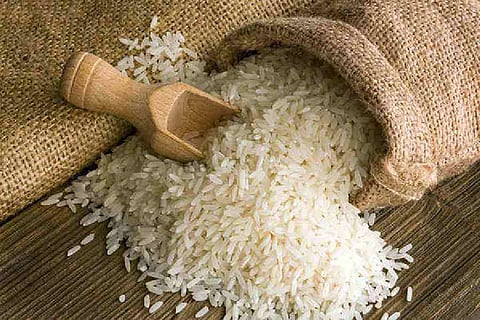
- Home
- Live Blog
- Breaking News
- Top Headlines
- Cities
- NE News
- Sentinel Media
- Sports
- Education
- Jobs

New Delhi: Department of Food and Public Distribution said on Friday that in order to manage the overall food inflation and prevent speculation that pushes up prices, the government has decided that the stock position of rice and paddy must be declared by wholesalers and retail traders, big chain retailers, and millers in all states and union territories.
The department said that these business entities should declare paddy and rice in categories such as broken rice, non-basmati white rice, parboiled rice, basmati rice, and paddy.
“The declarations have been updated every Friday on the portal (https://evegoils.nic.in/rice/login.html) of the Department of Food and Public Distribution. The stock position of rice has to be declared by these entities within 7 days of the issue of the order,” the department officials said.
They said that it has also been decided to start the retail sale of ‘Bharat Rice’ to general consumers to check inflationary trends in the food economy. “In the first phase, 5 lakh metric tonnes (LMT) of rice have been allocated for retail sale under the ‘Bharat Rice’ brand through NAFED, NCCF, and Kendriya Bhandar. The retail price for the sale of Bharat rice to general consumers will be Rs. 29 per kg. Rice will be sold in 5 kg and 10 kg bags. The Bharat Rice will be available for purchase from mobile vans and physical outlets of the three central cooperative agencies to begin with, and it will also be available through other retail chains, including e-commerce platforms, very soon,” the officials said.
They said that the domestic prices of rice are increasing despite a good crop this Kharif, ample stocks with FCI and in the pipeline, and various regulations in place on rice exports.
“The retail prices have increased by 14.51 percent over the past year. In an effort to curb the price of rice, various steps have already been taken by the government,” they said.
The officials said that sufficient stock of good-quality rice is available with FCI, which is being offered to traders and wholesalers under OMSS at a reserve price of Rs. 29/kg.
“In order to increase the sale of rice in the open market, GoI reduced the reserve price of rice from Rs. 3100/Qtl to Rs. 2900/Qtl, and the minimum and maximum quantity of rice were revised to 1 MT and 2000 MT, respectively,” they said.
The officials said that regular publicity has been done by the FCI regional offices for wider outreach. As a result, the sale of rice has gradually increased.
“Till 31.01.2024, 1.66 LMT of rice has been sold in the open market, which is the highest sale in any year under OMSS (D) for rice,” the officials said.
The Department of Food and Public Distribution is also maintaining a close watch over the stock position of wheat to control prices and ensure easy availability in the country.
“The all-India average domestic wholesale and retail price of wheat is showing a decreasing trend over the past month and year. Atta (wheat) prices, too, are showing a decreasing trend over a week, month, and year in the average domestic wholesale and retail sections of India,” the officials said.
It said that in order to increase the availability of wheat in the open market and to control the prices of wheat, the Central government has been offloading wheat into the market through weekly e-auctions since June 28, 2023.
“It has now been decided to enhance the quantity of wheat being offered under OMSS in the weekly auctions to 5 LMT and also increase the lot size to 400 MT,” the officials said.
They said that sugar ex-mill prices have decreased by 3.5–4 percent since the start of the crushing season, and all India retail and wholesale prices of sugar are stable. “More than 99.9 percent of cane dues have been cleared in the sugar season 2022–23, and for the current season, 80 percent of cane dues have been cleared so far,” they said.
They said that the government is also closely monitoring the domestic retail prices of edible oils to ensure that the full benefit of the decrease in international prices is passed on to end consumers. (IANS)
Also Read: Bail matters ought to be decided as expeditiously as possible: Supreme Court
Also Watch: